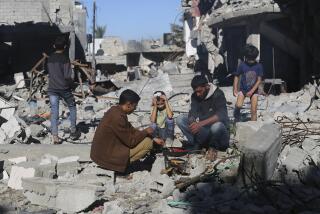Newlyweds Reunited by Truce in Bosnia : Europe: He is a Croat; she is a Muslim. They were married 13 days before the conflict began last April. She was caring for her ill mother and barred from returning to her husband--who was drafted into the army and told to shoot into her side of town.
- Share via
VITEZ, Bosnia-Herzegovina — When they told him to shoot into her side of town, he fired into the air. He tried to send messages to her. She wondered if she would ever see him again.
He is Davor, a Croat. She is Djana, a Muslim. They were married 13 days before war between Croats and Muslims broke out last April in central Bosnia.
The truce last month has at last put an end to the war they never believed in. And they hope the fragile peace will permanently bring them together again.
Djana and Davor fell in love as teen-agers 10 years ago, before it mattered if someone was Muslim or Croat or Serb.
“We never paid attention to who was who. It wasn’t important,” Davor said.
When war divided their town of Vitez, Djana went to the Muslim side to help her ailing mother.
“She thought she could go there, take care of her mother and come back again,” said 28-year-old Davor Markovic.
But the fighting became too fierce for her to cross back to the Croat sector where her husband was waiting, and the war parted them for 10 months.
Davor had to fight against his friends in the Muslim-led Bosnian army. Djana, 25, spent most of her time in a basement with 15 people, taking shelter from artillery attacks on the Muslim-held sector of town known as Stari Vitez.
Mobilized as a soldier in the Bosnian Croat Defense Council (HVO), he was sent to the Stari Vitez front twice. He knew Djana and her mother were somewhere nearby--on the other side.
“On those two occasions it was terrible for me,” he said. “I have to say I fired only when I had to and I tried not to hit anyone, because all my friends were there, my wife, her mother, my best man.
“So when I had to shoot, usually I shot in the air.”
Communicating with the other side was forbidden by the authorities. But Davor tried anyway.
At one point, they managed to exchange brief messages through the Red Cross, telling each other they were still alive, despite the ferocity of the fighting.
In December, he used the Croat militia radio to reach her. Old friends from Stari Vitez recognized Davor’s voice and they helped foster a few precious conversations for the couple by radio phone.
The radio contact was eventually discovered and forbidden. Davor’s desperate written messages were intercepted and destroyed by the Croat military authorities.
The war dragged on. Davor could only hope that his wife would survive in a quarter where up to 500 shells would land in a single day.
Djana began to think she would never see her husband again. “I had lost all hope,” she said in Stari Vitez.
Two exhausted armies at last signed a cease-fire in late February. As the shooting stopped along the line dividing the town, Davor heard that the United Nations would set up a checkpoint between the Croat and Muslim sectors.
When he went to the U.N. checkpoint, his Croat friends told him not to try to cross over when the truce was so fragile.
“They were warning me not to go. “Don’t expose yourself, they said. It’s still risky.’ But I turned a deaf ear to their warnings.”
Once at the checkpoint, Muslim soldiers on the other side recognized Davor and went to fetch Djana.
She arrived quickly, but they were still separated by barriers that had been set up between the two sides.
“We saw each other, some 10 meters away. They let us come closer together. Those 10 meters seemed like an eternity,” he said.
Finally, they walked the last distance separating them, without caring what rules they might be breaking.
“People applauded. People cheered,” Davor said. “The U.N. troops knew what was happening. They were smiling.”
The couple had only a few minutes together.
“He called me by my name. I called him his name,” Djana said. “We kissed and hugged each other. It was sad, especially when we had to part.”
Until commanders of both armies agree to the date when civilians will be allowed across former front lines, Davor and Djana have to settle for periodic rendezvous at the U.N. checkpoint.
Davor says he never believed in the war and blames the politicians on both sides for fomenting hatred. “I think it was senseless. Many young people died. Many of my young friends died on both sides.”
Once they are permanently reunited, Djana said, she hopes they won’t stay in the town where she has so many horrible memories. “I would like to go somewhere far away from here to forget what has happened. If there’s a chance.”
More to Read
Sign up for Essential California
The most important California stories and recommendations in your inbox every morning.
You may occasionally receive promotional content from the Los Angeles Times.












